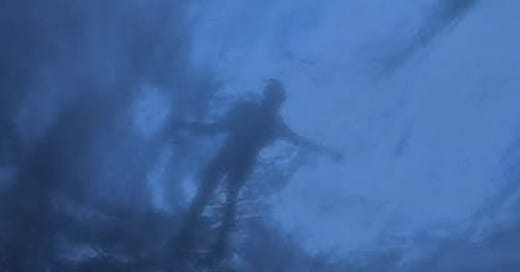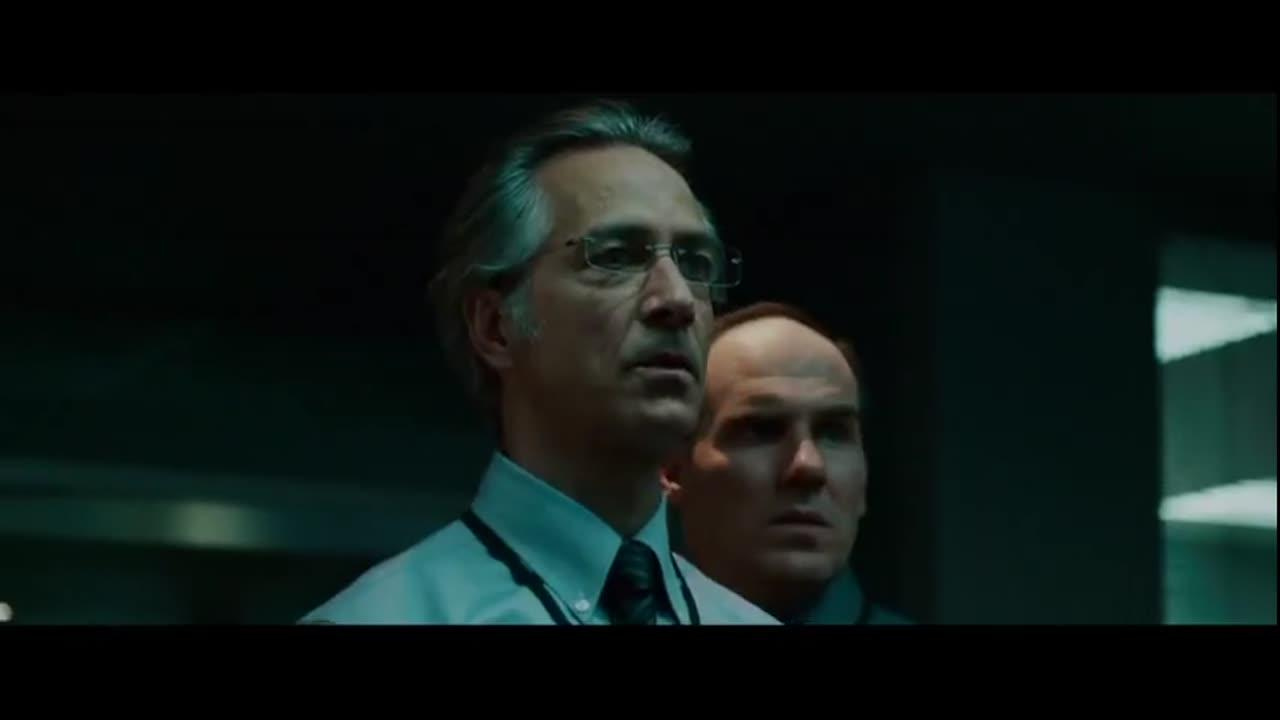Darkness. Thunder rumbles amid the sound of pelting rain and howling wind. Violins begin a low, mournful chord that passes into a somber woodwind solo. Flashes of lightning briefly illuminate a tossing, empty sea. Empty? No, not quite. A shadowy man-shaped figure drifts insensible on the face of the deep.
This opening sequence to The Bourne Identity (2002) contains manifold artistic strengths. Not only does it set the tone for the central conflict of the entire film (and, arguably, the whole trilogy), but also it is the first half of a deliberate “rhyme” that bookends with the conclusion to the third film, The Bourne Ultimatum (2007). In that conclusion, we find the same shadowy figure once again floating as if dead.
Nor are the parallels between these scenes merely artistic. In fact, the visuals of the scenes point to a striking harmony in plot and character development as well. Moreover, when viewed together as the beginning and end of a single unified event, a “Scriptural imagination” can discern a workable parallel to the chaotic situation at “the beginning”: “the earth was without form and void, and darkness was upon the face of the deep” (Gen 1:2, RSVCE). And, as the “Scriptural imagination” passes into the “Sacramental imagination,” a Catholic can see reflected in these scenes an image of a central drama at the heart of Baptism.
No, I am not making a case for a crypto-Catholicism embedded in Hollywood. Rather, I am attempting to “take every thought [or movie] captive to obey Christ” (2 Cor 10:5). After all, the close-up of Jason Bourne’s original dog tags in Ultimatum reveals that he is or was a Roman Catholic, so there’s gotta be some connection, right? So, since ‘grace builds on nature’ (cf. ST I, q. 1, a. 8, ad. 2), if I may invite your indulgence, I shall attempt to “build” theologically upon the “nature” of these secular movies. Let’s “baptize” Jason Bourne.
(SPOILER ALERT – but these movies are two decades old, so…)
As is revealed throughout The Bourne Identity, Jason Bourne used to be a covert assassin working for the CIA. He had lured his latest target aboard a yacht in the Mediterranean, when a crisis of conscience derailed his Manchurian Candidate-esque programming. Refusing to pull the trigger, he leapt into the sea, but not before he was shot twice in the back. Floating in the water, acute amnesia set in, erasing his memories and leaving him a total blank. Thus, the man we meet in the opening sequence is adrift physically and mentally, his old identity completely wiped away.
This is the man we meet in the opening sequence: adrift physically and mentally, his old identity completely wiped away.
The search for his identity and then the struggle against the evil of his past drives the plot of the entire Bourne trilogy. It reaches its conclusion at the end of The Bourne Ultimatum, when he returns to the very spot on which he definitively accepted the CIA programming and his assassin identity was ‘born.’ Now, however, in full possession of all his memories, he makes a different choice.
“I remember. I remember everything. I’m no longer Jason Bourne.”
Just at that moment, however, his pursuers catch up to him, and he is forced to flee. In the end of the resulting chase, he leaps from the top of a building into the East River while one of his pursuers fires a carefully aimed shot at his back. His body crashes into the water and floats motionless while a news anchor’s voice cuts in to wrap up the falling action. The camera work is strikingly similar to the opening scene of Identity. The audience is left in suspense, fearing that the man we have come to know as “David Webb” has paid for his heroism with his life.
But no! With the first electronic strings hit of Moby’s “Extreme Ways,” his limbs twitch. The man lives! The song builds and he swims off camera, finally free of the life from which it has been so hard to escape. His moral awakening, begun before the beginning of Identity, is now complete. The man who emerges from the river is no longer “Jason Bourne,” nor really “David Webb” – at least as he was before entering the “program.” Instead, this man has a totally new “identity,” a totally new life that is just beginning.
Not only do the plot points of these two scenes line up at the beginning and the end of the Bourne trilogy, but, taken as bookends of one long, unified scene, they also map rather neatly onto the basic plot points of the drama of Baptism:
First, there is a conversion. “Repent,” says St. Peter to the remorseful crowd on Pentecost, “and be baptized every one of you in the name of Jesus Christ for the forgiveness of your sins” (Acts 2:38). In The Bourne Identity, the whole story is triggered by his crisis of conscience and refusal to commit murder. Meanwhile, the conclusion of Ultimatum is precipitated by his fundamental rejection of the programming that made him into ‘Jason Bourne.’ In the ritual of the Sacrament, the catechumen is interrogated: “Do you reject Satan? And all his empty works? And all his empty promises?”
Second, there is immersion in water, which symbolizes an “undoing” of the old, sinful life. “You have put off the old nature,” St. Paul reminds the Colossians, “with its practices” (3:9). Floating unconscious in the Mediterranean at the start of Identity, the CIA programming of ‘Jason Bourne’ is destroyed. At the end of Ultimatum, ‘David Webb’s fall into the East River is the end of him, at least to the public eye. “All of us,” teaches St. Paul, “who have been baptized into Christ Jesus were baptized into his death” (Rom 6:3).
Third, in the midst of the waters, there is the beginning of a “new life” (cf. CCC 1265). Amnesia’s erasure of ‘Jason Bourne,’ serves as the beginning, not only of the whole Bourne trilogy, but of a whole new life for the man that is rescued from the Mediterranean. And the life that returns to the limbs of the man who fell into the East River, at the end of Ultimatum, is a life that is finally free for a fresh start. “If anyone is in Christ,” says St. Paul, “he is a new creation; the old has passed away, behold, the new has come” (2 Cor 5:17).
All of this culminates in being ‘drawn from the waters,’ a symbol of resurrection. “You were buried with him in baptism,” St. Paul teaches, “in which you were also raised with him” (Col 2:12). Being rescued from the Mediterranean is an escape from death that allows a new life to begin. Swimming to shore of the East River is the end of the movie, but the beginning of a life free from the specter of ‘Jason Bourne.’ Jesus explicitly taught that baptism is a kind of “re-birth” into a new and higher kind of life: “Truly, truly, I say to you, unless one is born of water and the Spirit, he cannot enter the kingdom of God” (Jn 3:5).
Thus, if a Catholic may be permitted to “baptize” the introduction and conclusion of the Bourne trilogy by considering them through a Scriptural and Sacramental “imagination,” these films take on a “new life,” as it were. By the labors of the producers, directors, actors, cameramen and so on, these films have a secular life fitting to the nature of merely human art. However, when viewed through a lens of grace they can “take on” a higher meaning; they can become reflections of that supernatural mode of existence that we have received in Christ: the “life of grace.”
Moreover, I believe this connection can be expanded. These two scenes admirably introduce and conclude the central drama of the story: Bourne’s struggle to escape from his previous identity and the sinister agents of his former masters who would rather see him dead than free. Though Baptism sets us free from sin and death, we are still beset by the effects of that old way of life (e.g., concupiscence) and by the agents of our former master who “prowl about the world, seeking the ruin of souls.”
No matter how many agents they send after him, Bourne outwits, outfights, or out-toughs every single one and gains his freedom. Similarly, the help of God’s grace, begun in us at Baptism, empowers us to beat back every temptation, overcome every obstacle and remain true to who God has made us to be.
Spiritual warfare may seem tough – brutal at times. But the Apostles teach us to have courage in the fight. When we are united to Christ, says St. Paul, “we are more than conquerors” (Rom 8:37). “Submit yourselves to God,” advises St. James: “resist the devil and he will flee from you” (James 4:7). Stand fast, fellow soldiers, and let the power of God terrify the devil. And when you do, I think you can imagine a look of terror in his eyes, not unlike that in the eyes of Noah Vosen in Ultimatum when CCTV footage at Waterloo Station reveals who has been picking off his agents one by one:
“[Blasphemy omitted]. That’s Jason Bourne.”









This is a brilliant article! Thank you. As a longtime fan of the Bourne franchise, this crystallizes my thoughts on it. If I may, I'd also like to suggest that the arc of Jason's character in the first three movies not only reflects baptism as you so clearly demonstrate, but also offers a particularly poignant look at the state of the modern Western world, lost in a search for meaning and identity, with its collective memory mostly erased, thrown back on its gut instincts for survival. There's hope for Jason, because of his conscience, buried deep within him but still alive and growing. But he needs a Marie to really bring him out of himself. His conscience (don't kill Wombosi!) can take him a long way, but ultimately he needs love (Bourne: "When something you love is taken from you, you want to know the truth"). Love, suffering, identity, personal choice, nature, memory, the totalitarian control of the CIA and its technological web - I believe John Paul II would have had a lot to say about these movies...